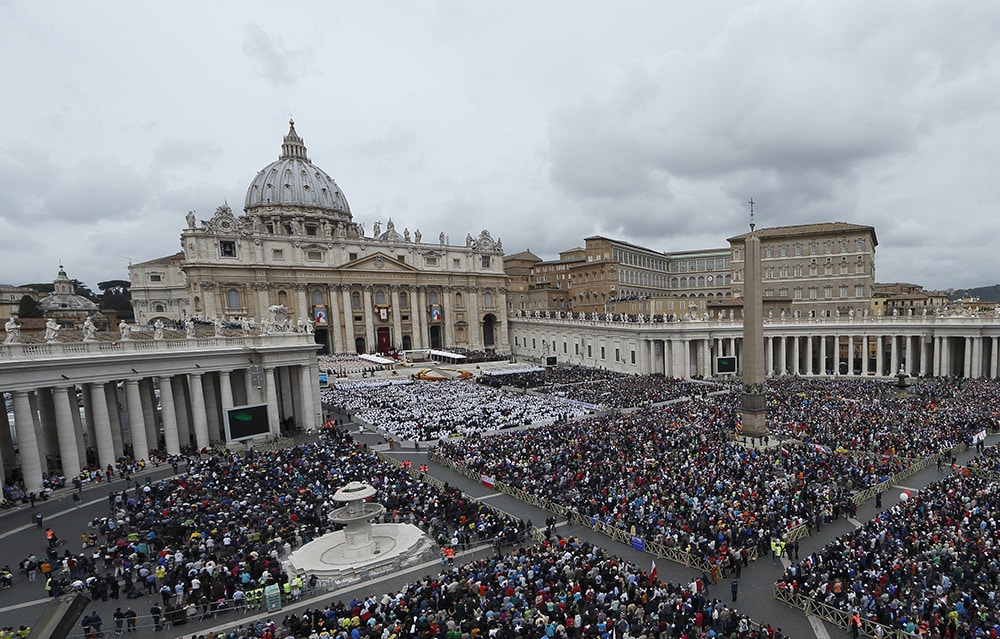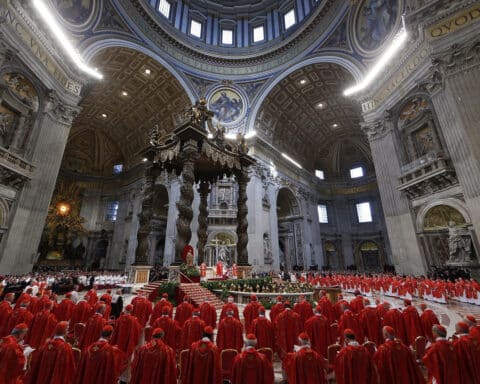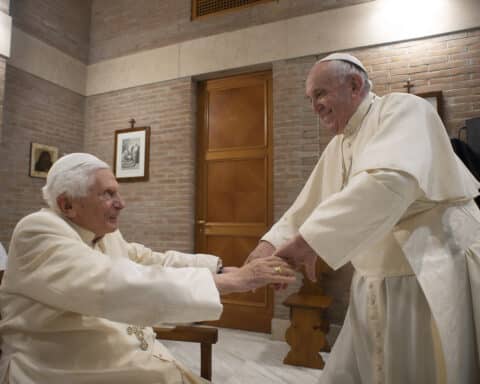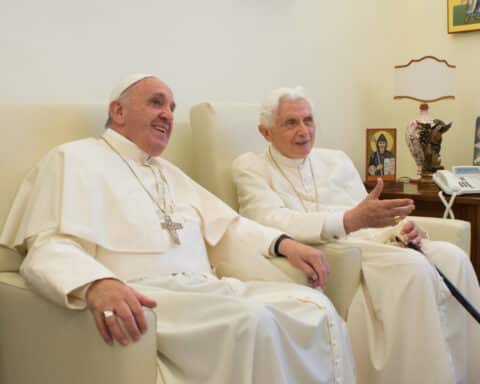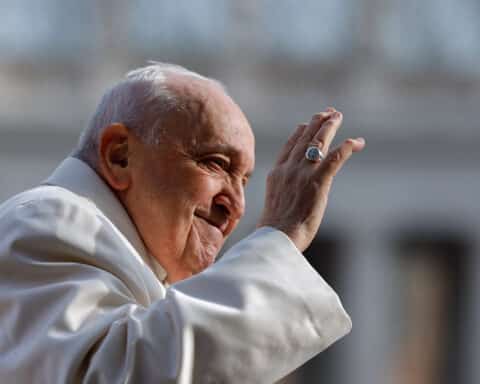Recently, Catholics have faced back-to-back scandals involving popes. The first came on Oct. 22, the feast day of Pope St. John Paul II, when the headline on the front page of the Wall Street Journal declared, “Pope Backs Civil Unions for Gay Couples.” The article quoted Pope Francis, in a newly debuted documentary on the pope called “Francesco,” saying that “what we have to create is a civil union law. That way they are legally covered. I stood up for that.” These words proved difficult (if not impossible) to square with prior magisterial teaching of the Church, from the Congregation for the Doctrine of the Faith’s warning in 2003 that “to vote in favor of a law so harmful to the common good is gravely immoral,” to St. John Paul’s warning to a group of Brazilian bishops that the push for civil union laws should call them to instead “proclaim the truth about marriage and the family” with “pastoral firmness” and that “not to do so would be a serious pastoral omission that would lead people into error.”
But the second scandal would engulf not only Francis, but Pope Benedict and particularly Pope St. John Paul II himself. On Nov. 10, the Secretariat of State of the Holy See released the “Report on the Holy See’s Institutional Knowledge and Decision-Making Related to Former Cardinal Theodore Edgar McCarrick (1930 To 2017),” better known simply as the McCarrick report. As the Washington Post rightly summarizes, the report (commissioned by Pope Francis) “largely spared Francis,” while laying “the lion’s share of the blame on St. John Paul II,” for making McCarrick archbishop of Washington in 2000 (and eventually a cardinal) “despite having commissioned an inquiry that found he had slept with seminarians.” The report itself suggests that “John Paul II’s past experience in Poland regarding the use of spurious allegations against bishops to degrade the standing of the Church played a role in his willingness to believe McCarrick’s denials.” In an article headlined “Still Saintly?” the Post suggests that these revelations “may complicate the legacy of Pope John Paul II.”
Each of these scandals, in its own way, raises important questions about papal authority and infallibility. How can Catholic belief in infallibility survive Pope John Paul II’s terrible misjudgments about McCarrick, Pope Benedict’s decisions about sanctions against him, and Pope Francis’ comments not only about civil unions, but his decision to canonize John Paul II? To answer this, it’s important to get one thing right from the outset: Papal infallibility doesn’t exist for the pope’s sake. There’s a popular “oracular” misunderstanding of infallibility, imagining that it means that the pope is a sort of divine oracle, and that every word he utters is divinely inspired, or at least protected from error. It doesn’t. Instead, papal infallibility exists for our sake.
To understand why, consider the relationship between heresy and schism. The first pope, St. Peter, warned that in the future, “there will be false teachers among you, who will introduce destructive heresies and even deny the Master who ransomed them, bringing swift destruction on themselves” (2 Pt 2:1). So that’s the first thing for us to heed, here in the future: Heresy is widespread, and we need to avoid it, since it’s spiritually deadly. But there’s another message directed as us future Christians. At the Last Supper, Jesus prayed not only for the apostles, but “for those who will believe in me through their word” (Jn 17:20): that is, us. And what is his prayer to the Father for us? “[T]hat they may be brought to perfection as one, that the world may know that you sent me, and that you loved them even as you loved me” (v. 23). So that’s the second thing for us to heed: We need to be perfectly united, since any kind of schism compromises the credibility of the Christian witness.
It’s important to recognize that these warnings against heresy and schism were not things to avoid in the first century. Peter was warning us — and Jesus was praying for us — in the future. So we can’t use the excuse that things are different these days. They were talking about our days, not their own. But this logically requires infallibility. If the Church were ever to command us to believe something false, we would be in an impossible position, a sort of Catch-22 in which we were forced to choose between heresy or schism, despite both ways being forbidden us. The medieval theologians had a name for such a situation: a perplexus simpliciter, in which every action is sinful. And they saw clearly that it was impossible that God should ever put us into such a situation, since it would be contrary both to his loving and rational nature to force his people to do what he forbade them from doing.
This is the very Catch-22 that Protestants find themselves in. As the Methodist scholar Ben Witherington observed, in the Protestant view, “There is always a tension in the church between unity among believers and truth as it is understood and held by believers. Protestantism has tended to uphold Truth, with a capital T, while intoning unity with a lowercase u, with the end result that Protestant churches and denominations have proved endlessly divisive and factious.” That is, to try to heed Peter’s warning, they’ve chosen to disobey Christ’s will that we should all be one. Hopefully it’s clear why the Protestant “solution” isn’t a solution at all. It’s just accepting part of the Gospel (against heresy) while rejecting or ignoring another part (against schism). And accepting part of the Gospel is hardly orthodoxy.
Infallibility is the belief that God will never put us into this Catch-22, not because the pope is so holy, but because God is. We can fully embrace Church unity because we rest secure that in doing so, we’re also embracing the one, true faith. This is why St. Thomas Aquinas says that the canonization of saints is infallible. He offers two reasons: first, that “it would be a damnable error to venerate sinners as saints, since those discovered their sins or heresy (if it so happened) could be led into error”; and, second, that “the common judgment of the Church cannot be erroneous” for the simple reason that “we are bound to believe what the Church commonly decrees.” Since we have to believe it, it must be true, or else we’re back in that Catch-22 again. And since we can count on God not to trap us like that, we can therefore know with certainty that canonizations (including that of St. John Paul II) are trustworthy.
Aquinas’ reasoning here is solidly biblical, and it has special bearing for our understanding of the papacy. He points out that in John 11:51, even though Caiaphas was wicked, “since he was high priest for that year, he prophesied that Jesus was going to die for the nation.” Or consider one of Jesus’ most surprising sayings about the Pharisees: “The scribes and the Pharisees have taken their seat [cathedra, in Latin] on the chair of Moses. Therefore, do and observe all things whatsoever they tell you, but do not follow their example. For they preach but they do not practice” (Mt 23:2-3). For all of the criticism that Jesus had of the Pharisees, you might expect him to say that his followers should disobey them. But instead, the New Testament paints quite a different picture: that God was working through the visible leadership of the Jews, even when that leadership was horribly corrupt. As the Jewish Encyclopedia notes, the rabbinical term for this sort of infallibility was “binding and loosing.” When we hear of the pope speaking ex cathedra, or see Jesus giving the binding and loosening authority to Peter (cf. Mt 16:19), this is what’s going on.
This doesn’t mean that everything that St. Peter, or the Jewish high priest, or the Pharisees said was infallible. Anyone reading the New Testament can see quite the opposite: Peter denies Christ, the high priest condemns him, and the Pharisees constantly harass him to try to trip him up. It all turns on whether or not the pope is acting as pope. A friend of mine, Father Peter Ascik of the Diocese of Charlotte, North Carolina, gives a helpful analogy. When a Supreme Court justice is writing the majority opinion in a case, what he’s saying there is the law. But if that same justice is writing a dissent, or is giving a talk somewhere, or is merely opining on a legal question in their private capacity, none of that carries the weight of law. We might still take their commentary seriously, given their standing on the court, just as Aquinas encourages us to take the pope’s biblical exegesis especially seriously, but we’re not bound to obey it, as we would be in the case of a Supreme Court decision or (especially) an ex cathedra papal declaration. And this is also why Jesus can simultaneously tell us to obey the Pharisees but not to imitate them.
Nothing in infallibility protects the pope from making bad personnel decisions, or from advancing the episcopal career of incompetent or even wicked men. After all, we don’t even think that all of Jesus’ picks were orthodox and holy. As he said himself about Judas, “Did I not choose you twelve? Yet is not one of you a devil?” (Jn 6:70). Nor does infallibility protect the pope from saying erroneous things in off-the-cuff or private remarks, or in less-formal settings such as homilies. Rather, it means simply this: When the pope is speaking and acting in an authoritative manner as pope — when he canonizes someone, or declares something to be a part of the Faith — we listen and obey, secure in the confidence that the Holy Spirit is protecting him (and ultimately, us) from error. And ultimately it means that come what may, whatever scandal may break out tomorrow, whatever clerical reputations may be ruined, we can rest secure in the bosom of the Catholic Church, holding firmly to the union and the orthodoxy to which we are called by Christ.
Joe Heschmeyer blogs at shamelesspopery.com and is the author of “Pope Peter: Defending the Church’s Most Distinctive Doctrine in a Time of Crisis” (Catholic Answers Press, $16.95).

